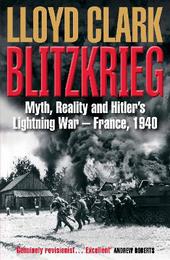
|
Blitzkrieg: Myth, Reality and Hitler's Lightning War - France, 1940
Paperback / softback
Main Details
| Title |
Blitzkrieg: Myth, Reality and Hitler's Lightning War - France, 1940
|
| Authors and Contributors |
By (author) Lloyd Clark
|
| Physical Properties |
| Format:Paperback / softback | | Pages:480 | | Dimensions(mm): Height 198,Width 129 |
|
| Category/Genre | Second world war |
|---|
| ISBN/Barcode |
9781782391364
|
| Classifications | Dewey:940.54214 |
|---|
| Audience | |
|---|
| Edition |
Main
|
| Illustrations |
2x8pp black & white photographs, maps
|
|
Publishing Details |
| Publisher |
Atlantic Books
|
| Imprint |
Atlantic Books
|
| Publication Date |
7 September 2017 |
| Publication Country |
United Kingdom
|
Description
The German campaign in France during the summer of 1940 was pivotal to Hitler's ambitions and fundamentally affected the course of the Second World War. Having squabbled about fighting methods right up to the start of the campaign, the German forces provided the Fuhrer with a swift, efficient and decisive military victory over the Allied forces. In achieving in just six weeks what their fathers had failed to accomplish during the four years of the First World War, Germany altered the balance of power in Europe at a stroke. Yet, as Lloyd Clark shows in this enthralling new book, it was far from a foregone conclusion. Blitzkrieg tells the story of the campaign, while highlighting the key technologies, decisions and events that led to German success, and details the mistakes, good fortune and chronic weaknesses in their planning process and approach to war fighting. There are also compelling portraits of the officers who played key roles, including Heinz Guderian, Erwin Rommel, Kurt Student, Charles de Gaulle and Bernard Montgomery. Clark argues that far from being undefeatable, the France 1940 campaign revealed Germany and its armed forces to be highly vulnerable - a fact dismissed by Hitler as he began to plan for his invasion of the Soviet Union - and offers a gripping reassessment of the myths that have built up around one of the Second World War's greatest military victories.
Author Biography
Lloyd Clark is a senior academic in the Department of War Studies at the Royal Military Academy Sandhurst and Professorial Research Fellow in War Studies, Humanities Research Institute, University of Buckingham. He is the author of several books, including Anzio: The Friction of War, Arnhem: The Greatest Airborne Battle in History and Kursk: The Greatest Battle, has contributed to numerous others and lectures on military history all over the world. He lives in rural Hertfordshire with his wife and three children.
ReviewsThis genuinely revisionist account of the Battle of France in 1940 proves a deeply shocking fact - we are essentially still in thrall to the view of Blitzkrieg tactics that Adolf Hitler and Joseph Goebbels wanted us to have, even over three-quarters of a century later. Lloyd Clark's brilliant analysis proves that Fall Gelb (the Germans' Plan Yellow) wasn't all about unstoppable, superior panzers and Stukas, but was in fact an audacious, highly risky infantry-based plan that could have gone badly wrong given a different Allied mindset. * Andrew Roberts * Lloyd Clark has written a lucid, intelligent and thought-provoking reappraisal... His groundbreaking, detailed research will make it the seminal work on the fall of France in 1940. The story of the breakthrough unfolds at a fascinating and cracking pace... Blitzkrieg is a remarkable book that will reshape many of the traditional assertions made about this battle. * Robert Kershaw * A breakthrough book, bringing the drama of Hitler's May 1940 offensive in France vividly to life - alongside a major reappraisal of the campaign's significance. Excellent. * Michael Jones * A compelling and fresh retelling of one of the century's most intriguing and significant campaigns. * BBC History Magazine * A masterly account teeming with vivid personalities and the usual mixture of heroism, incompetence, and luck * Kirkus Reviews * In this new volume, acclaimed historian Lloyd Clark . . . paints a very different look at the German victory . . . Clark does an excellent job of describing the first critical five days of the campaign . . . He highlights multiple opportunities the French and British had to stop the German advance at vulnerable moments . . . Lloyd presents a well-balanced narrative that highlights the knife-edge victory of the German forces. * New York Journal of Books *
|